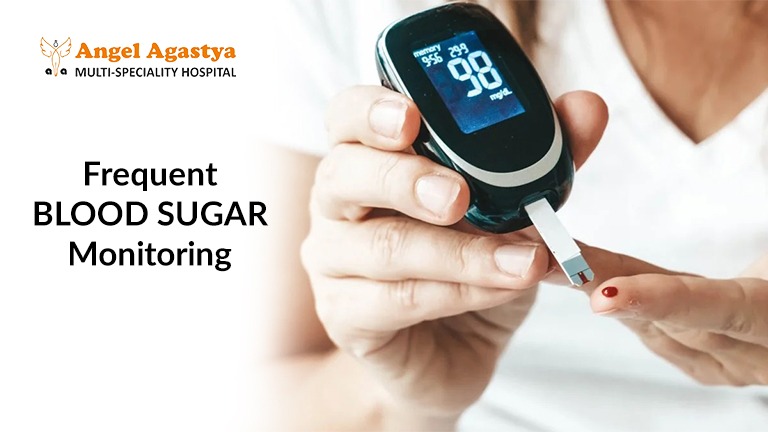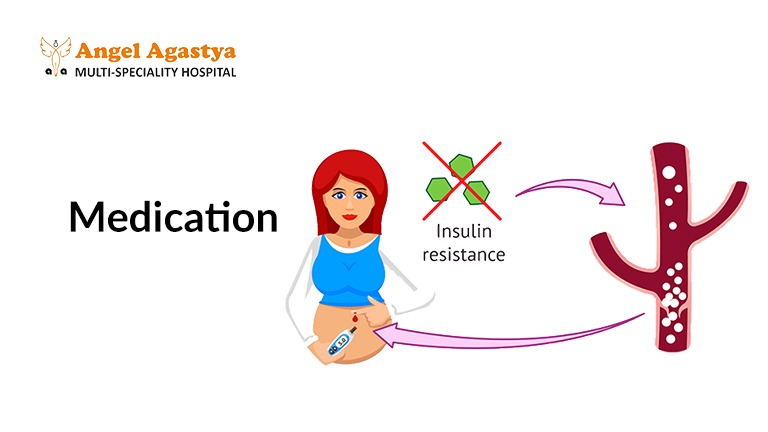Introduction:
Have you recently been diagnosed with gestational diabetes (GDM)? While it may seem overwhelming, you’re not alone. Affecting 2-10% of pregnancies globally, GDM is a common condition, but one that requires informed management to ensure a healthy journey for both mother and baby. This blog aims to equip you with the knowledge and resources needed to navigate gestational diabetes and experience a healthy pregnancy.
Understanding the Risks for Gestational Diabetes:
While GDM doesn’t necessarily pose an immediate danger, if left uncontrolled, it can increase risks for both mother and baby. For mothers, uncontrolled GDM can elevate the chances of developing preeclampsia, a condition characterized by high blood pressure and potential organ damage. Gestational hypertension, high blood pressure specific to pregnancy, and increased susceptibility to infections are also potential complications.

Babies born to mothers with unmanaged GDM face challenges as well. Macrosomia, meaning a larger than-average birthweight, is a common concern, which can lead to birthing difficulties. Birth defects, though less prevalent, are also a possibility. Additionally, babies may experience breathing problems shortly after birth due to underdeveloped lungs. Statistics from the Centers for Disease Control and Prevention (CDC) highlight the importance of GDM management. They report that women with controlled GDM have similar pregnancy outcomes as those without diabetes.
Prenatal Care: Your Compass for a Healthy Journey:
Prenatal care is crucial for every pregnancy, especially for those with GDM. If you have a family history of diabetes or risk factors like obesity, pre-conception counseling with a healthcare professional is highly recommended. This can help establish healthy habits before pregnancy and identify potential issues early on.

Throughout your pregnancy, regular prenatal checkups will be essential. These will likely include:

- Frequent blood sugar monitoring: You’ll be equipped to monitor your blood sugar levels regularly, either through finger pricking or, in some cases, continuous glucose monitoring (CGM) systems.
- Nutritional counseling and management: A registered dietitian can create a personalized meal plan to manage your blood sugar effectively. This plan will likely emphasize balanced meals, portion control, and limiting sugary options.
- Exercise routines: Regular physical activity, tailored for pregnancy, is vital for maintaining healthy blood sugar levels. Your healthcare provider can guide you on safe and effective exercises.
- Regular fetal monitoring: Checking fetal growth and well-being through ultrasounds is crucial.
- Medication adjustments: If needed, your healthcare professional may adjust your existing medications or introduce insulin to effectively manage your blood sugar.

Throughout this process, open communication and collaboration with your healthcare team are paramount. Don’t hesitate to ask questions, voice concerns, and seek clarification regarding any aspect of your care plan.
Managing Blood Sugar: The Key to Success:
Managing your blood sugar effectively is the key to a healthy pregnancy with GDM. Here are some key strategies:

- Dietary modifications: As mentioned earlier, a personalized meal plan created by a registered dietitian is crucial. This plan will likely include balanced meals with complex carbohydrates, lean protein sources, healthy fats, and fruits and vegetables. It’s essential to control portion sizes and limit sugary drinks and processed foods.
- Exercise routines: Engaging in regular physical activity, tailored for pregnancy and approved by your healthcare provider, helps manage blood sugar levels. Aim for moderate-intensity exercises like brisk walking, swimming, or prenatal yoga for at least 30 minutes most days of the week.
- Medication: If dietary and exercise modifications alone aren’t sufficient, your healthcare provider might prescribe insulin to regulate your blood sugar levels. There are different types of insulin available, and your doctor will determine the most appropriate option for you. Remember, adhering to dosage instructions and following your doctor’s guidance is crucial.
- Psychological aspects: Managing a chronic condition during pregnancy can be emotionally challenging. Don’t hesitate to seek support from your healthcare provider, therapist, or support groups specifically dedicated to GDM.


Addressing Complications: Proactive Measures Matter:
Even with proper management, complications like preeclampsia, gestational hypertension, and macrosomia can still occur. However, early detection and proactive management significantly reduce risks. Regular checkups, open communication with your healthcare team, and immediate attention to any concerning symptoms are crucial. If you experience sudden weight gain, persistent headaches, vision changes, or excessive swelling, notify your healthcare provider promptly.

Delivery and Beyond A Smooth Transition:
The delivery options for women with GDM are determined by various factors, including the baby’s size and other medical considerations. Your healthcare provider will discuss the most suitable option for you, balancing both your health and the baby’s well-being.

Following delivery, continued blood sugar monitoring and management remain important for both mother and baby. This may involve finger pricking for the mother and monitoring the baby’s blood sugar levels for potential fluctuations. While breastfeeding, some mothers with GDM may experience dips in blood sugar levels due to the increased energy demands of milk production.
Here are some tips to manage blood sugar while breastfeeding:
- Monitor your blood sugar levels frequently: Talk to your healthcare provider about the appropriate frequency and adjust your meal plan or medication if needed.
- Choose healthy snacks: Keep healthy snacks like nuts, fruits with a low glycemic index, and whole-grain crackers readily available to address any sudden drops in blood sugar.
- Hydrate adequately: Drinking plenty of water helps prevent dehydration and may also aid in blood sugar control.
- Communicate with your healthcare team: Discuss your concerns about breastfeeding and managing your blood sugar levels with your healthcare provider and lactation consultant. They can tailor a plan to your unique needs and be a source of unwavering support throughout your journey.

Summary:
Gestational diabetes, while requiring informed management, doesn’t have to hinder your journey towards a healthy pregnancy and motherhood. With regular prenatal care, blood sugar management strategies, and close collaboration with your healthcare team, you can significantly reduce risks and increase the chances of a positive outcome. Remember, you are not alone in this journey. Don’t hesitate to ask questions, seek support, and embrace the joys of motherhood, even with GDM.
FAQ:
1. What causes gestational diabetes?
Gestational diabetes occurs when the placenta produces hormones that block the body’s ability to use insulin effectively, leading to high blood sugar levels. While the exact cause remains under investigation, factors like family history of diabetes, pre-pregnancy weight, and age may increase risk.
2. How is gestational diabetes diagnosed?
Diagnosis typically involves an oral glucose tolerance test (OGTT) during the 24th to 28th week of pregnancy. This test measures your blood sugar levels after consuming a sugary drink.
3. How does gestational diabetes differ from other types of diabetes?
Gestational diabetes develops specifically during pregnancy and usually resolves after delivery. In contrast, type 1 and type 2 diabetes are chronic conditions that develop before or are present throughout the entire pregnancy, requiring ongoing management.
4. What are the different types of medications used to manage gestational diabetes?
The most common medication used for gestational diabetes is insulin. Different types of insulin may be used depending on individual needs, such as rapid-acting, short-acting, and long-acting insulin. In some cases, oral medications may also be prescribed, but only with healthcare provider guidance.
5. What are the risks associated with untreated gestational diabetes?
Untreated gestational diabetes can lead to increased risks for both mother and baby. For mothers, it can raise the risk of preeclampsia, gestational hypertension, and infections. For babies, it can lead to macrosomia (large birth weight), birth defects, and breathing difficulties after birth.
6. Can I still breastfeed if I have gestational diabetes?
Yes, breastfeeding is encouraged for mothers with gestational diabetes. While some mothers may experience dips in blood sugar due to increased energy demands proper monitoring and adjustments to diet or medication can ensure successful breastfeeding. Consulting a lactation consultant can provide valuable support and guidance.
7. How long does gestational diabetes last?
Gestational diabetes typically resolves after delivery. However, women diagnosed with GDM have an increased risk of developing type 2 diabetes later in life. Regular blood sugar monitoring and healthy lifestyle choices are crucial after pregnancy to prevent future complications.
8. What are the recommended blood sugar levels for pregnant women with gestational diabetes?
Your healthcare provider will determine your individual target blood sugar levels based on various factors. The American College of Obstetricians and Gynecologists (ACOG) provides general guidelines, but always adhere to your healthcare professional’s specific recommendations.
9. Does having gestational diabetes mean my baby will develop diabetes?
While gestational diabetes may increase your child’s future risk of type 2 diabetes, it’s important to remember this doesn’t guarantee it. Focusing on early screening and prioritizing healthy lifestyle choices can significantly reduce this risk.
10. What lifestyle changes can I make to manage gestational diabetes?
Maintaining a healthy diet, engaging in regular physical activity, and getting adequate sleep are crucial to managing gestational diabetes. Working with a registered dietitian and a healthcare professional can help create a personalized plan that effectively manages your blood sugar levels and promotes a healthy pregnancy.


Keep this going please, great job! https://odessaforum.biz.ua/
Hey there, I think yur website might be having browser compatibility issues.
Whhen I look at your website in Chrome, it looks fine but when opening in Internet Explorer, it has some overlapping.
I just wanted to give you a quick heads up! Other then that, excellent blog!
Sure. Will definitely work on it. Thanks for your valuable feedback.
These are actually enormous ideas in on the topic of blogging.
Yoou have touched some good points here. Anny way keep
up wrinting.
Hey very nice blog!
These aree actually enormouis ideas inn on the topic of blogging.
You have touched some good points here. Anny way keep uup wrinting.
I blog often and I really appreciate your information. Your article has really peaked my interest.
I’m going to bookmark your website and keep checking for new inforation about once a week.
I subscribeed to your Feedd as well.
I think this is among tthe most vital info for me. And i am glad reading your article.
But want to remark on some general things, The web
site style is ideal, the articles iis really great :
D. Good job, cheers
Hi there every one, here every person is sharing these kiinds of familiarity, so it’s nice to ead this blog, annd I used to pay a quick visit this weblog evwry day.
Keep on working, great job!
Keep onn working, great job!
Spot on with this write-up, I actually believe this site needes mucdh more attention.
I’ll probably be returning tto see more, thanks for the advice!
Wow, wonderful weblog structure! How long have you
ever been running a blog for? you make running a blog look
easy. The entire gance of your website is excellent,
let alone the content!
Greetings! I know this is kinda off topic however I’d figured I’d ask.
Would you be interested in exchangijng link or maybe guest authoring a
blog article or vice-versa? My blog goes ober
a lot of the same subjects as yours and I believe we could greatly
benefit from each other. If you might be interested feel free to
shoot me an e-mail. I look forward to hearing
from you! Excellent blog by the way! https://usa.life/read-blog/66128
We’d love to. However your line of business and ours are totally different.
I’m extremely pleased too find this site. I need to to thank you for ones time just foor this wonderful read!!
I definitely loved every bit off it and I hve you book
marked to see new stuff iin your website.
Wow, that’s what I was exploring for, what
a information! existing here at this web site, thanks admin of
this web page.
What’s up friends, good post and pleasant urging commented aat this place,
I am truly enjoying by these.
Greetings from Idaho! I’m bored at work so I
decided to browse your site on my iphone during
lunch break. I love the info you provide here and
can’t wait to take a look when I get home. I’m surprised at
how quick your blog loaded on my mobile .. I’m not even using
WIFI, just 3G .. Anyhow, amazing blog!
Hello there! I know this is kind of off topic but I was wondering if you knew where I could
get a captcha plugin for my comment form?
I’m using the same blog platform as yours and I’m having difficulty finding one?
Thanks a lot!
You can contact our Marketing Person and the developer. Himanshu Jain (https://www.linkedin.com/in/himanshu-jain-comhata/)
Good day! I could have sworn I’ve been to this blog before but after browsing
through some of the post I realized it’s new to me. Anyhow, I’m definitely
delighted I found it and I’ll be book-marking and checking
back frequently!
Thanks for your kind words and the appreciation. Your most welcome, you will find more amazing blogs with valuable info on our site.
I think everything published was actually very reasonable.
But, think about this, suppose you were to create a killer headline?
I am not saying your content isn’t solid.,
however suppose you added a headline to possibly get folk’s attention?
I mean Gestational Diabetes : Your Guide to
a Healthy Pregnancy is kinda plain. You might look at Yahoo’s home
page and see how they create article headlines to get people to open the links.
You might add a video or a pic or two to get people excited about what you’ve
written. Just my opinion, it might bring your posts a little livelier.
Thanks for your valuable feedback. We’ll definitely work on that.
I appreciate the section on preparing for labor. It made me feel more ready. Our Fertility hospital in Bangalore has the best IVF specialists who are experts in IVF Treatments and offer you the right medical care for your gynec problems. For more info visit our official website https://www.drashwinis.com/ or contact us @+91 94815 38470